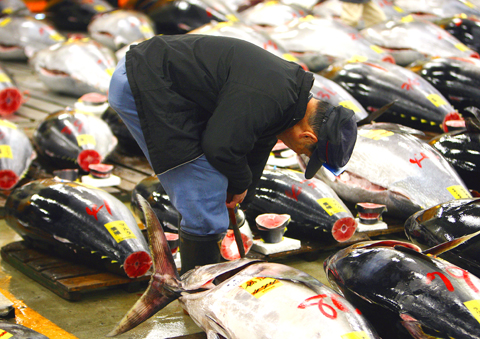A huge bluefin tuna was sold for US$176,000 in the first auction of the year at a Tokyo fish market yesterday, amid growing pressure on Japan to help save the threatened fish.
The 232.6kg bluefin tuna — caught off Japan’s northern region of Aomori — fetched a winning bid of ¥16.28 million (US$176,000), said an official at the Tsukiji fish market.
It was the second-biggest such bid yet, after a record ¥20.02 million paid for a bluefin tuna in 2001, the official said.

PHOTO: BLOOMBERG
The fish was bought by a pair of Japanese and Hong Kong sushi restaurant owners who had also made a joint top bid for a bluefin tuna in the first auction of last year at Tsukiji, the world’s biggest fish market.
“I want to make an impact on the Japanese and Hong Kong economies by buying the highest-priced tuna,” the Sankei Shimbun daily’s Web site quoted the Hong Kong sushi restaurant owner as saying.
The auction came amid worries among Japanese, the world’s biggest consumers of bluefin tuna, about growing calls for a trade ban for the fish, which environmentalists warn is on its way to extinction.
In a move to protect the species, an international body meeting in Brazil in November agreed to cut the allowable bluefin tuna catch in the eastern Atlantic and Mediterranean by about 40 percent this year compared with last year.
Japan, which consumes more than 80 percent of tuna caught in the Mediterranean, endorsed the proposal and agreed to reduce its own catch quota accordingly.
“Tuna is a precious food, which is the core of Japanese food culture,” said Keiichi Suzuki, president of the Tsukiji fish market, where 2,280 tuna fish were auctioned yesterday.
“We would like to provide a stable supply while saving resources,” he said as a crowd of bidders clapped to celebrate this year’s first auction, with an opening bell echoing through the pre-dawn market.

WAITING GAME: The US has so far only offered a ‘best rate tariff,’ which officials assume is about 15 percent, the same as Japan, a person familiar with the matter said Taiwan and the US have completed “technical consultations” regarding tariffs and a finalized rate is expected to be released soon, Executive Yuan spokeswoman Michelle Lee (李慧芝) told a news conference yesterday, as a 90-day pause on US President Donald Trump’s “reciprocal” tariffs is set to expire today. The two countries have reached a “certain degree of consensus” on issues such as tariffs, nontariff trade barriers, trade facilitation, supply chain resilience and economic security, Lee said. They also discussed opportunities for cooperation, investment and procurement, she said. A joint statement is still being negotiated and would be released once the US government has made

NEW GEAR: On top of the new Tien Kung IV air defense missiles, the military is expected to place orders for a new combat vehicle next year for delivery in 2028 Mass production of Tien Kung IV (Sky Bow IV) missiles is expected to start next year, with plans to order 122 pods, the Ministry of National Defense’s (MND) latest list of regulated military material showed. The document said that the armed forces would obtain 46 pods of the air defense missiles next year and 76 pods the year after that. The Tien Kung IV is designed to intercept cruise missiles and ballistic missiles to an altitude of 70km, compared with the 60km maximum altitude achieved by the Missile Segment Enhancement variant of PAC-3 systems. A defense source said yesterday that the number of

Taiwanese exports to the US are to be subject to a 20 percent tariff starting on Thursday next week, according to an executive order signed by US President Donald Trump yesterday. The 20 percent levy was the same as the tariffs imposed on Vietnam, Sri Lanka and Bangladesh by Trump. It was higher than the tariffs imposed on Japan, South Korea and the EU (15 percent), as well as those on the Philippines (19 percent). A Taiwan official with knowledge of the matter said it is a "phased" tariff rate, and negotiations would continue. "Once negotiations conclude, Taiwan will obtain a better

FLOOD RECOVERY: “Post-Typhoon Danas reconstruction special act” is expected to be approved on Thursday, the premier said, adding the flood control in affected areas would be prioritized About 200cm of rainfall fell in parts of southern Taiwan from Monday last week to 9am yesterday, the Central Weather Administration (CWA) said. Kaohsiung’s Taoyuan District (桃源) saw total rainfall of 2,205mm, while Pingtung County’s Sandimen Township (三地門) had 2,060.5mm and Tainan’s Nanhua District (南化) 1,833mm, according to CWA data. Meanwhile, Alishan (阿里山) in Chiayi County saw 1,688mm of accumulated rain and Yunlin County’s Caoling (草嶺) had 1,025mm. The Pingtung County Government said that 831 local residents have been pre-emptively evacuated from mountainous areas. A total of 576 are staying with relatives in low-lying areas, while the other 255 are in shelters. CWA forecaster